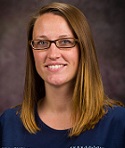非常抱歉,
你要访问的页面不存在,
非常抱歉,
你要访问的页面不存在,
非常抱歉,
你要访问的页面不存在,
验证码:

职称:professor
所属学校:Kansas State University
所属院系:Psychology
所属专业:Psychology, General
联系方式:532-0807
I received my MS in Experimental Psychology from Wake Forest University in 2005 and my PhD in Cognitive Psychology at Kent State University in 2009. After graduate school, I spent 4 years as a post-doctoral researcher at Washington University St. Louis, and I recently joined the Department of Psychological Sciences at Kansas State University in 2013. At the highest level, I am interested in memory systems and how they change with age. My three main lines of research are related to individual differences and age-related differences in working memory. The first line involves evaluating the efficacy of different strategies that people use to help improve their memory. For instance, when memorizing a grocery list, why do some people recite the list repeatedly and others organize the items according to the layout of the grocery store (i.e., produce, meat, dairy)? And when do certain strategies benefit us the most? In another line of work, I am interested in why performance on working memory tasks predicts how someone will perform on other important cognitive tests such as an IQ test or the SAT. Most recently, I have studied how individuals effectively segment, or chunk, incoming information and update their working memory representations accordingly. Findings have shown that an individual’s ability to segment information at encoding predicts how well they are able to remember it at a later time. In conducting this research, I have combined experimental and neuroscience techniques and have worked with various populations including college students, cognitively healthy older adults as well as older adults with mild cognitive impairment and early stage Alzheimer’s disease.
I received my MS in Experimental Psychology from Wake Forest University in 2005 and my PhD in Cognitive Psychology at Kent State University in 2009. After graduate school, I spent 4 years as a post-doctoral researcher at Washington University St. Louis, and I recently joined the Department of Psychological Sciences at Kansas State University in 2013. At the highest level, I am interested in memory systems and how they change with age. My three main lines of research are related to individual differences and age-related differences in working memory. The first line involves evaluating the efficacy of different strategies that people use to help improve their memory. For instance, when memorizing a grocery list, why do some people recite the list repeatedly and others organize the items according to the layout of the grocery store (i.e., produce, meat, dairy)? And when do certain strategies benefit us the most? In another line of work, I am interested in why performance on working memory tasks predicts how someone will perform on other important cognitive tests such as an IQ test or the SAT. Most recently, I have studied how individuals effectively segment, or chunk, incoming information and update their working memory representations accordingly. Findings have shown that an individual’s ability to segment information at encoding predicts how well they are able to remember it at a later time. In conducting this research, I have combined experimental and neuroscience techniques and have worked with various populations including college students, cognitively healthy older adults as well as older adults with mild cognitive impairment and early stage Alzheimer’s disease.